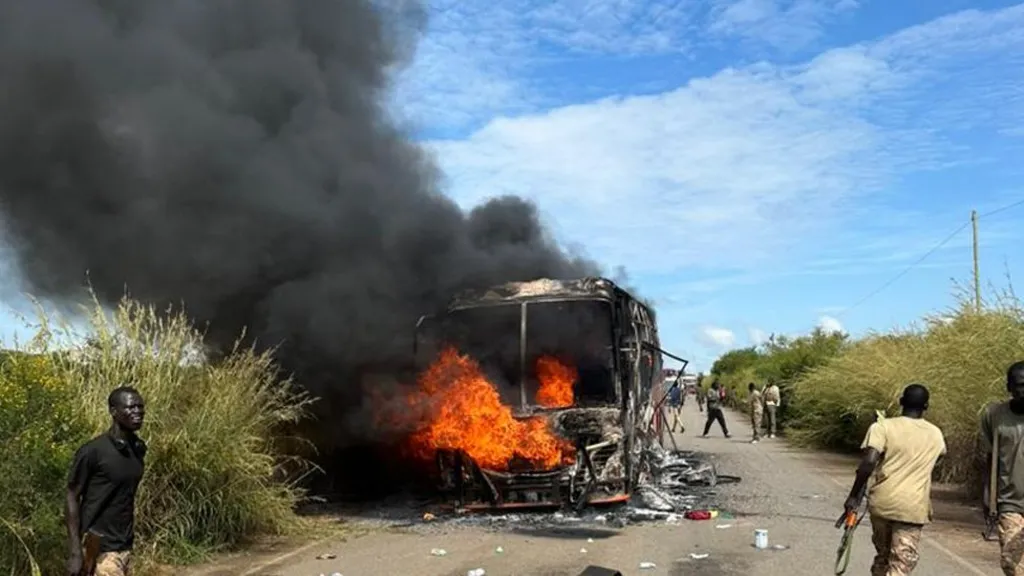Kidnap fears follow deadly South Sudan bus attack
3 min read

A long-distance bus traveling from Juba, the capital of South Sudan, to Kampala, Uganda, was violently attacked by gunmen on Tuesday morning, resulting in at least one death and fears that several passengers may have been kidnapped. The assault occurred on a major roadway south of Juba, highlighting ongoing security challenges in the region despite the presence of a peace agreement intended to resolve years of civil conflict.
Eyewitness images from the scene depicted a bus engulfed in flames, with thick black smoke billowing into the sky. The chaos and devastation of the attack underscore the perilous conditions faced by travelers in this part of the country.
According to the South Sudanese army, the attack claimed the life of a Ugandan national and left eight others injured. Army spokesperson Major General Lul Ruai Koang reported that seven additional passengers are unaccounted for, raising concerns that they may have been abducted by the assailants.
Gen. Koang attributed the attack to the National Salvation Front (NAS), a rebel group led by former deputy chief of staff Gen. Thomas Cirilo Swaka. This group has been active in areas south of Juba and throughout Central Equatoria state. Notably, NAS declined to sign the 2018 peace agreement that was designed to end the ongoing conflict in South Sudan, which has led to instability and violence across various regions.
In response to the attack, the army dispatched troops to the scene, reportedly engaging in a firefight with the assailants. However, the situation remains tense, and the absence of any immediate official statement from NAS regarding the incident has left many questions unanswered.
The highway linking Juba to Nimule, a southern border town, has a troubling history of violence. This latest attack follows a series of previous assaults on the same route. In August 2022, an ambush left 11 passengers—both South Sudanese and Ugandan—dead, while several others sustained injuries. Additionally, the tragic murder of two South Sudanese Catholic nuns traveling along this highway the previous year further highlights the ongoing risks faced by individuals on these roads.
 Despite a formal peace agreement, insecurity continues to plague South Sudan, making travel perilous for many. The government has struggled to enforce order and protect civilians, leaving large parts of the country vulnerable to attacks from various armed groups.
Despite a formal peace agreement, insecurity continues to plague South Sudan, making travel perilous for many. The government has struggled to enforce order and protect civilians, leaving large parts of the country vulnerable to attacks from various armed groups.
As this incident unfolds, it raises significant concerns not only for the safety of passengers but also for the broader implications regarding security and stability in South Sudan. The public’s fear of kidnapping and violence while traveling is palpable, and many are left questioning the effectiveness of the peace efforts that were meant to bring an end to such turmoil.
Efforts to combat the escalating violence will require coordinated action from the government and international partners. Addressing the root causes of conflict, engaging with local communities, and ensuring that adequate security measures are in place are crucial steps that need to be taken to restore confidence and safety for travelers.
As South Sudan navigates its complex socio-political landscape, the recent bus attack serves as a stark reminder of the persistent challenges that continue to undermine peace and security. The ongoing threats to civilian safety, coupled with the fears of kidnappings, call for urgent attention from both local authorities and international stakeholders committed to bringing stability to the region.
In the wake of this incident, it is essential for the South Sudanese government to prioritize security reforms and establish a robust response mechanism to protect its citizens. The road to lasting peace remains fraught with challenges, but immediate action is necessary to prevent further tragedies and ensure the safety of all who traverse these dangerous routes.